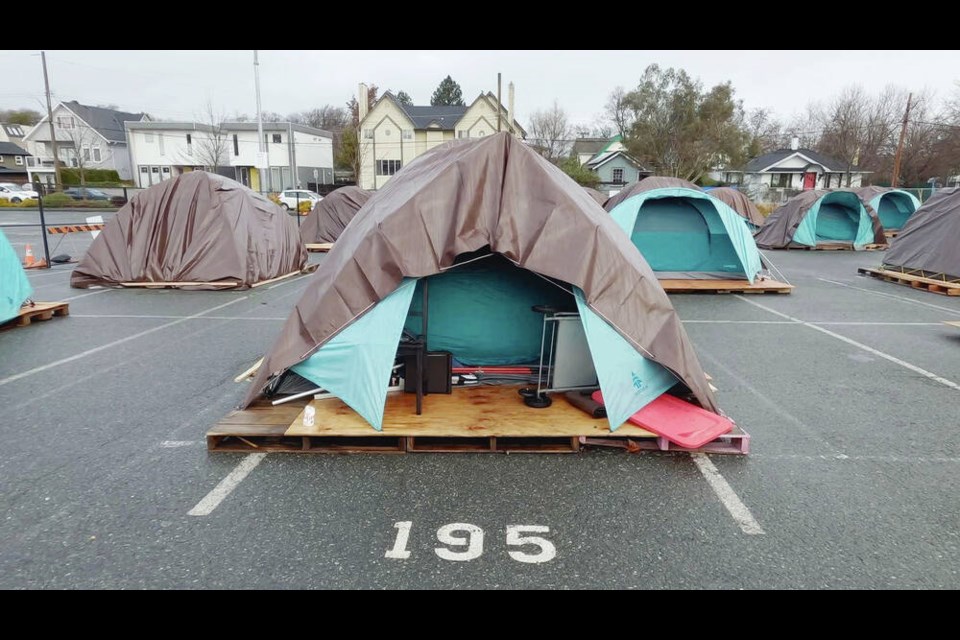Krista Loughton was walking through Central Park near the Crystal Pool with a GoPro camera just before Christmas 2020, sloshing through ankle-deep water after heavy December rain and snow.
The footage shows her approaching several tents where people are sheltering in the park.
“This is absurd. This is a swamp,” Loughton is heard saying.
A woman comes out of her tent, distraught. “This is bad. There’s sewer leaking out. The toilets are flooding up, and they’ve just left us,” she says, nearly in tears.
Loughton, a filmmaker who now serves as a Victoria city councillor, posted the clip online, where it was seen by then-mayor Lisa Helps, she said.
The city and province quickly responded, making the parking lot at 940 Caledonia Ave., next to Royal Athletic Park, available for a sanctioned encampment for those sheltering in the park.
They were given new tents and sleeping bags, as well as cots to keep them off the ground. The site was later turned into a temporary shipping-container community with 30 individual units dubbed Tiny Town, which ran for almost two and a half years before closing last fall.
The clip from Central Park became the opening scene of a documentary by Loughton premiering at the Victoria Film Festival on Thursday.
940 Caledonia gives viewers a firsthand look into the lives of people living in the encampment and their fight to survive a cold and wet winter in a tent.
After the flood, they faced a gale-force windstorm and freezing temperatures, said Loughton.
“I wanted viewers to leave the audience and never look at the unhoused in the same way again,” she said.
The 50-minute film begins with the flooding in Central Park that soaked tents, sleeping bags and blankets, leading to mould, and follows the move to the parking lot, where those sheltering and neighbours came together to build a community.
The woman in the opening clip, Tina Dawson, stepped up as an unofficial leader in the new encampment, helping to persuade people in Central Park to make the move, Loughton said. At 51, Dawson was homeless for the first time.
“I always say she was just on fire. It was as though she turned into a CEO and she was just, you know, making things happen,” Loughton said.
Shot partly on GoPro and without a narrator, the film has an intimate feel.
“That’s the comment I’ve received from people is they watch the film and they feel like they’re there,” Loughton said.
Loughton had been making films highlighting homelessness to influence politicians to address the problem, but spending nearly every day outside for three winter months making this documentary is what led her to run for council in 2022, she said.
“I could get a real sense of how cold it is. And how awful the conditions are for people living in tents and trying to survive in the winter and that’s when I decided firmly I’m running for council,” she said.
Loughton hopes the film will help garner support for shelters, supportive housing and other solutions to homelessness.
Since joining council, she has pushed for initiatives to support people living on the street, such as a 24/7 bathroom on Pandora Avenue, and a co-ordinator to help find housing for people living in parks.
940 Caledonia is Loughton’s second big film project. Her first, a feature-length film called Us and Them, spans more than 10 years and tells Loughton’s personal story of building friendships with several unhoused people.
Loughton said she was in over her head and unsure how to proceed when one of the film’s participants died, so she sought advice from Dr. Gabor Maté, a renowned addiction and trauma expert.
Maté helped Loughton recognize her own struggles and realize “we’re all the same. There is no us and them,” she said.
940 Caledonia is screening Thursday at 6 p.m. at the Blue Bridge Theatre.
Dawson, who is now housed, will join Loughton and another participant in the film for a post-screening Q&A.



